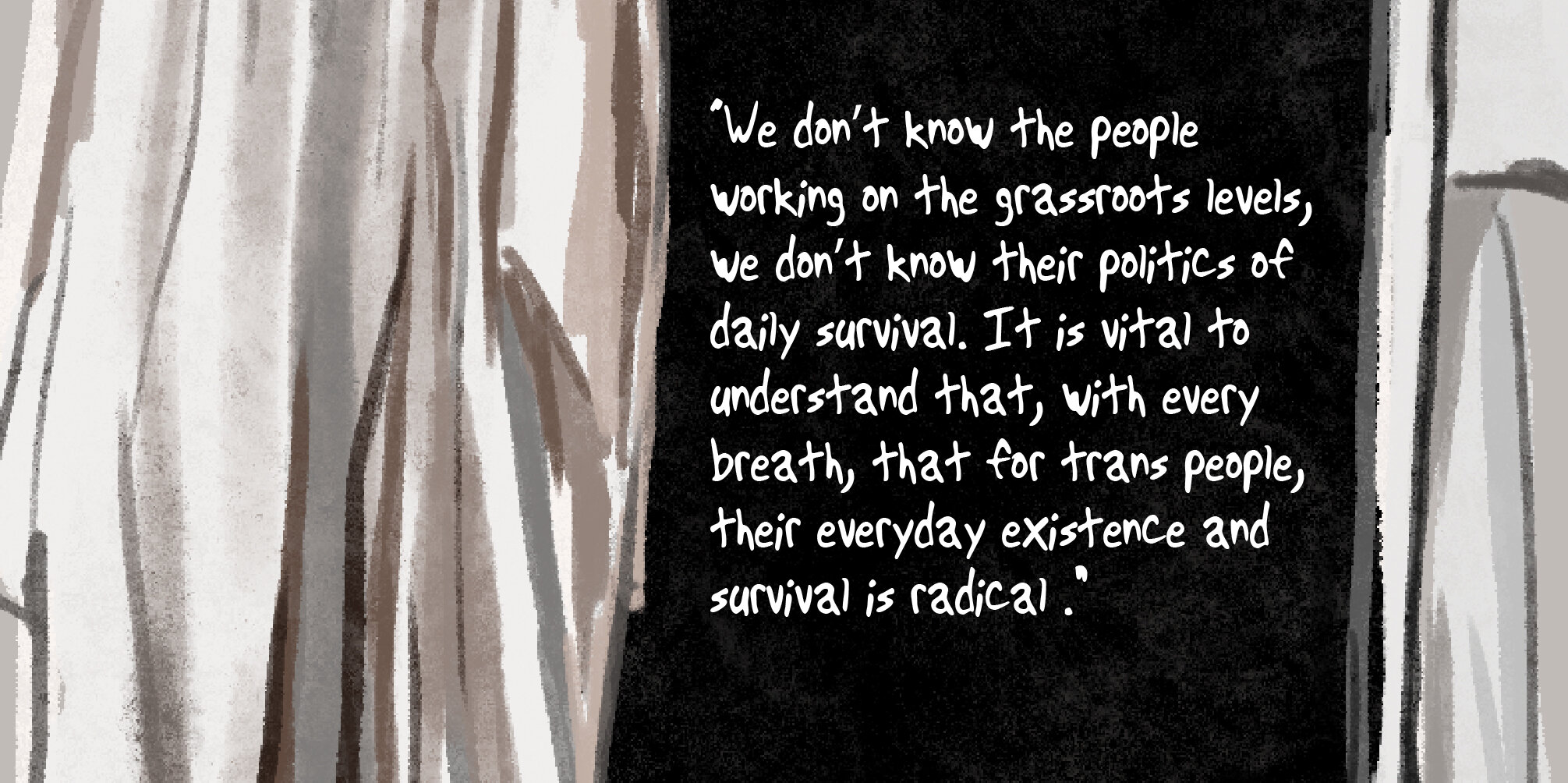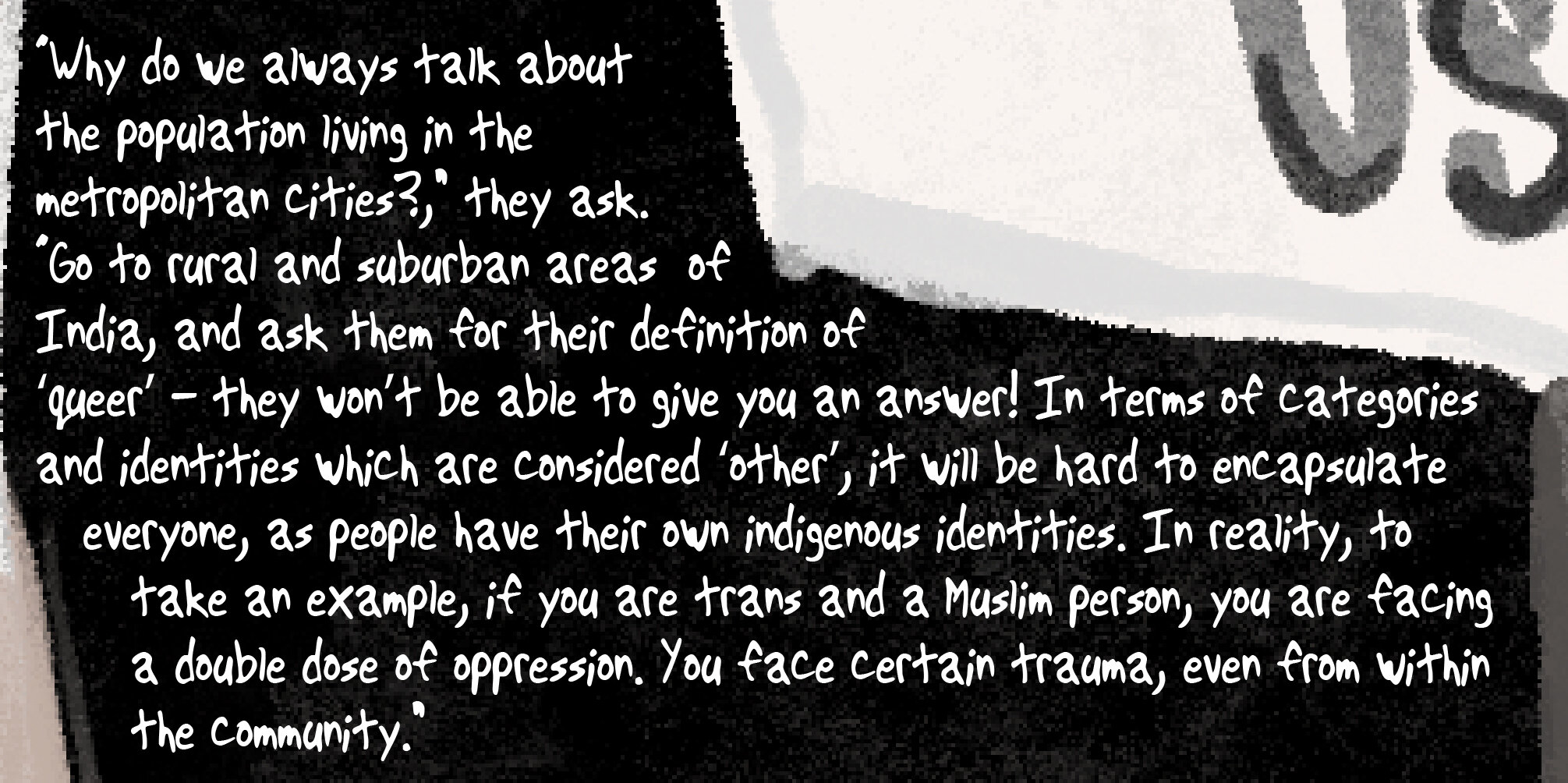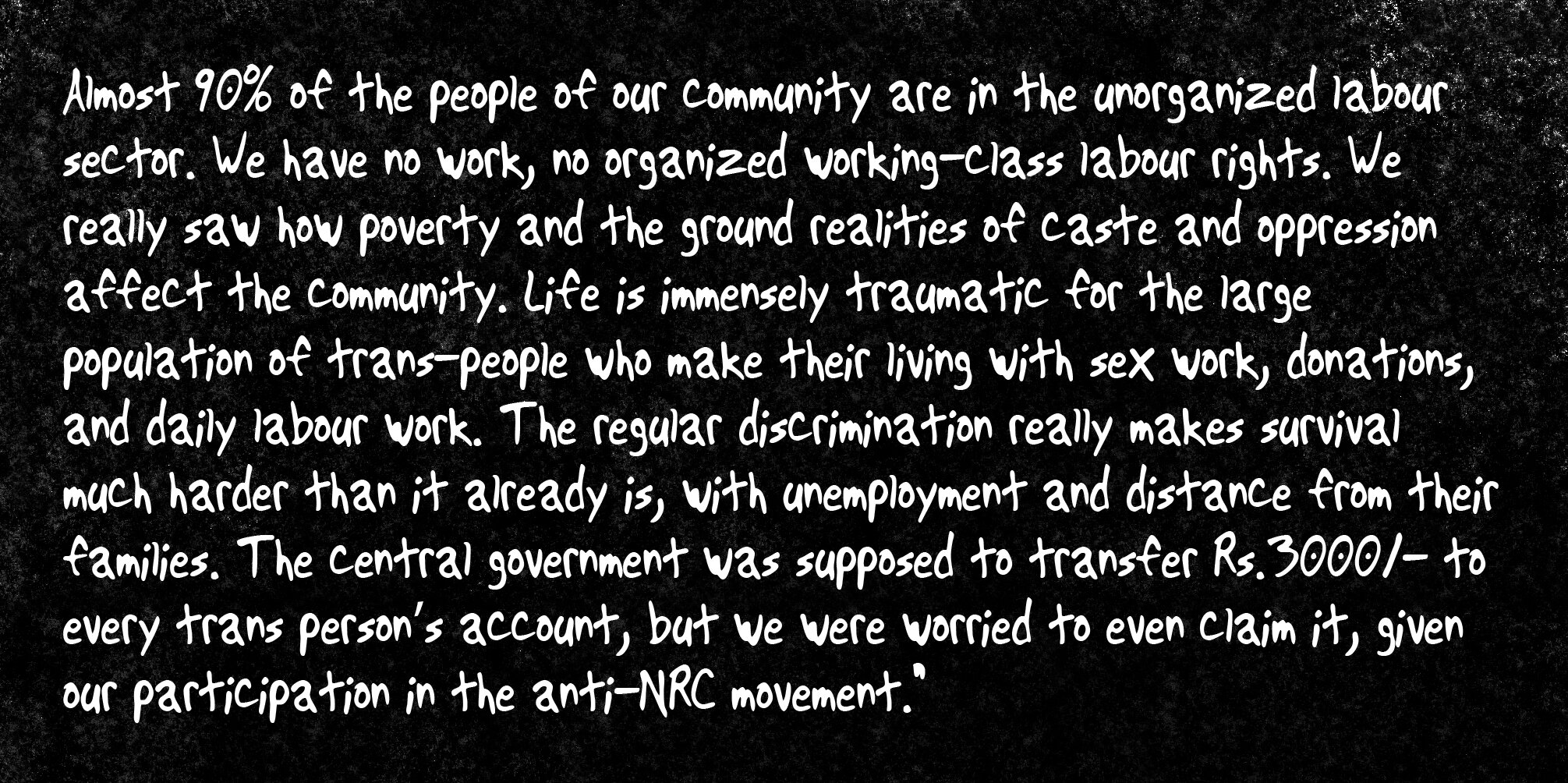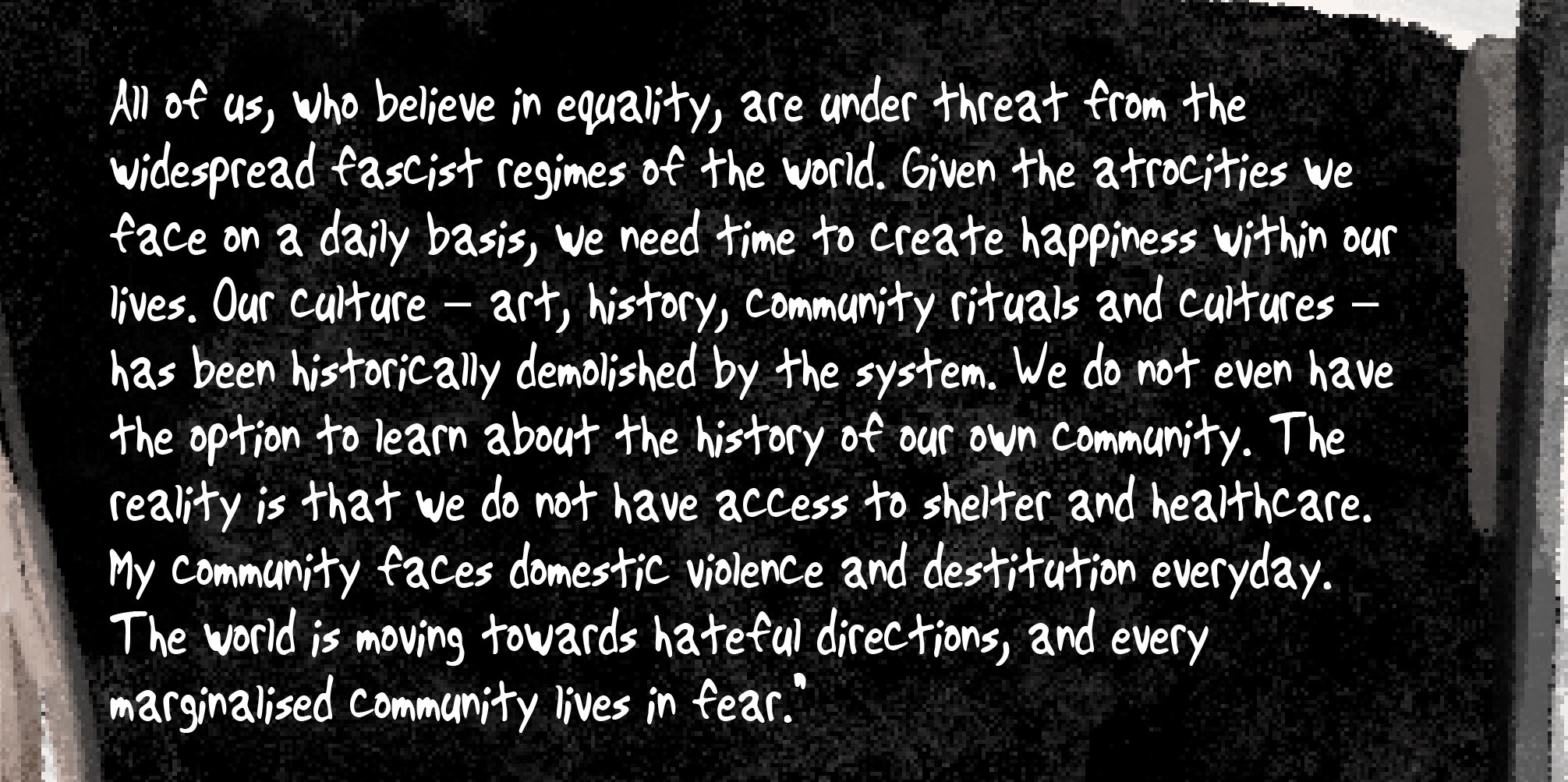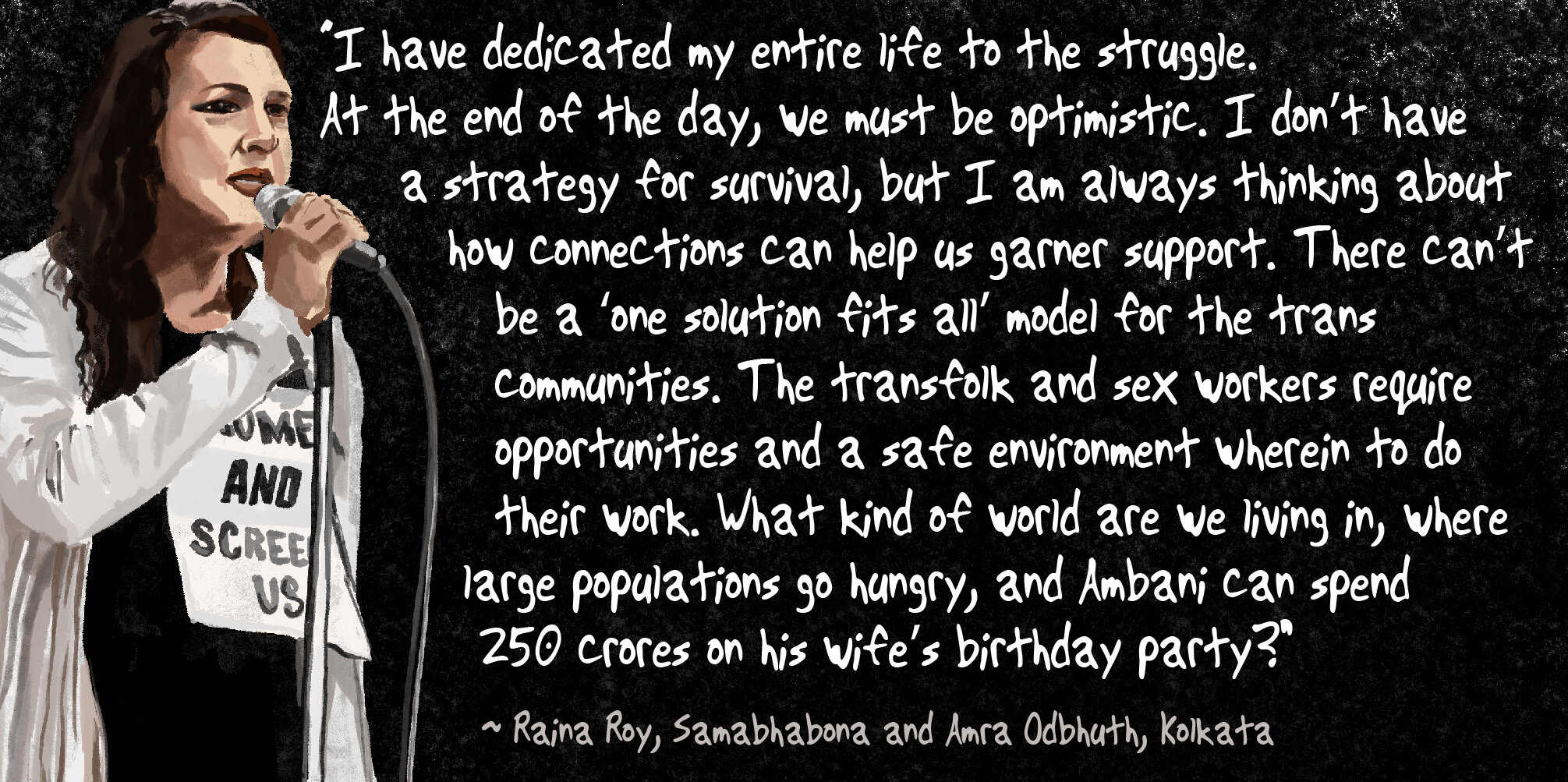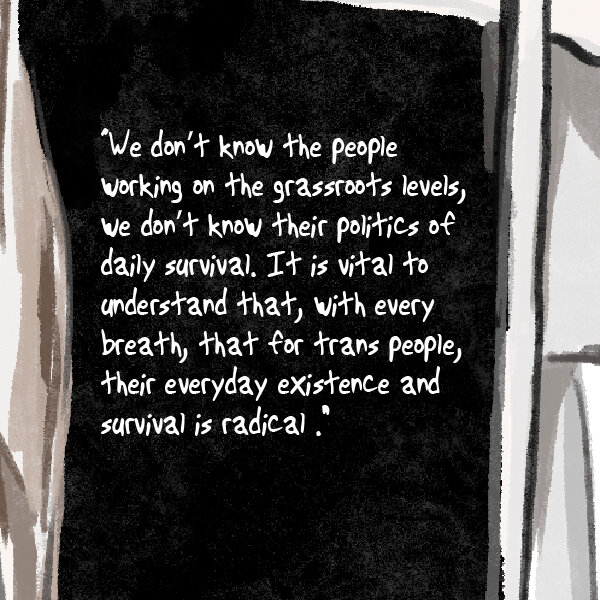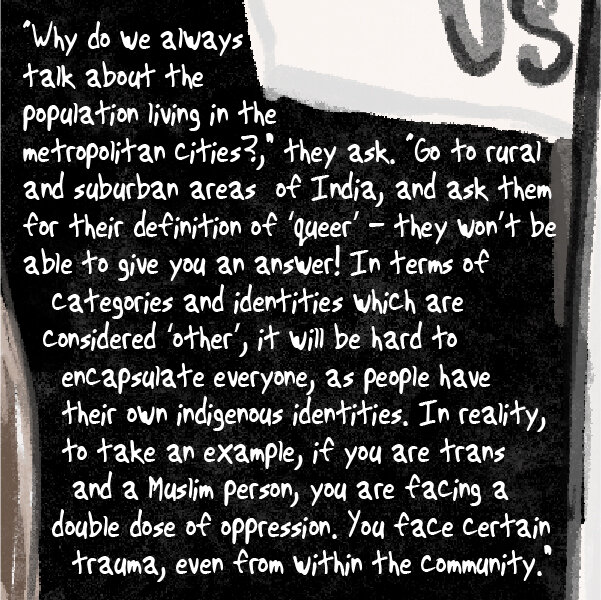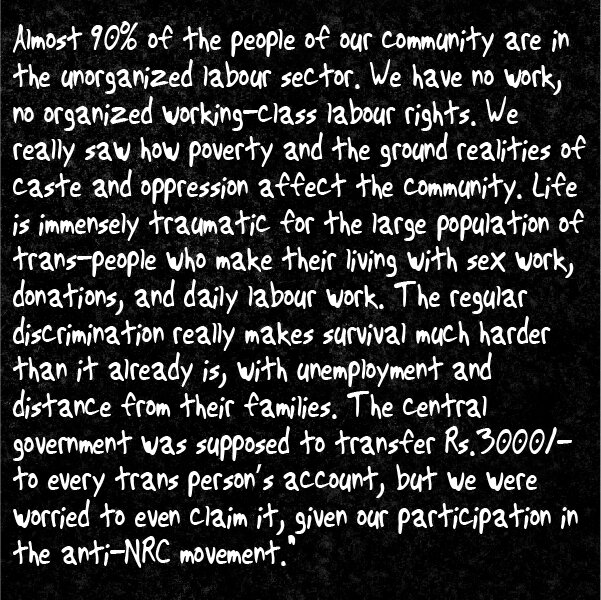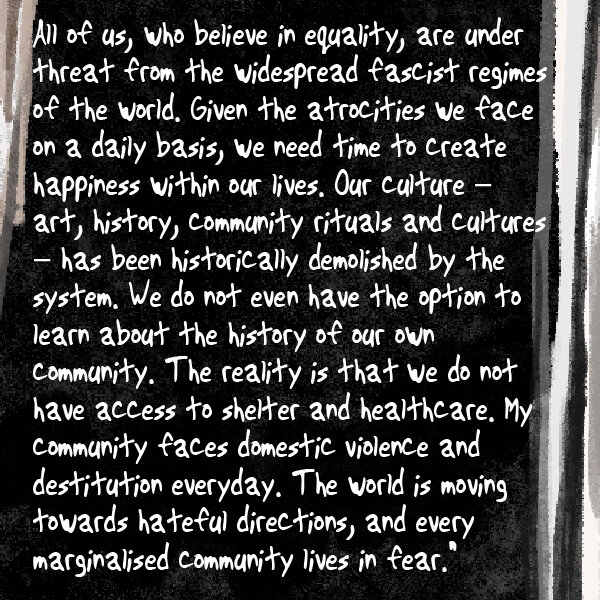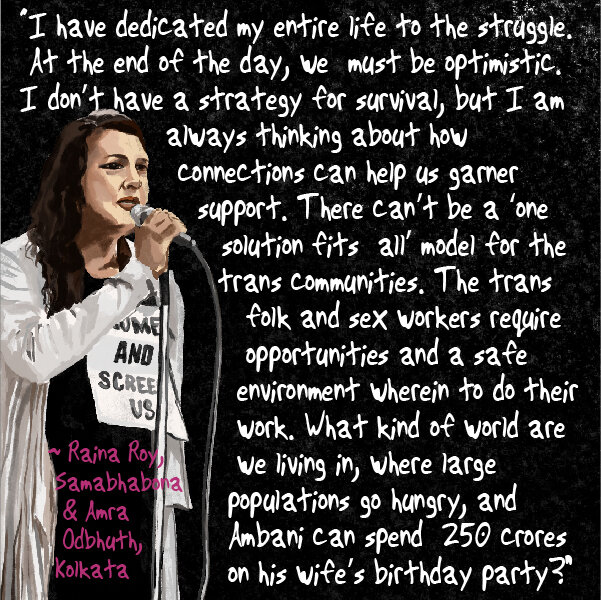Raina Roy
“We don’t know the people working on the grassroots levels, we don’t know their politics of daily survival. It is vital to understand that, with every breath, that for trans people, their everyday existence and survival is radical .”
Raina Roy is an activist and co-founder of trans led intersectional feminist organisation Samabhabona working with trans grassroot and minority issues in Bengal. They’re also the co-founder of Amra Odbhuth – a space for art, culture and performance for LGBTQUI community, which became a shelter home for the trans community during the pandemic. Their work in activism began almost 20 years ago, when they were still in school.
“Why do we always talk about the population living in the metropolitan cities?,” they ask. “Go to rural and suburban areas of India, and ask them for their definition of ‘queer’ - they won’t be able to give you an answer! In terms of categories and identities which are considered ‘other’, it will be hard to encapsulate everyone, as people have their own indigenous identities. In reality, to take an example, if you are trans and a Muslim person, you are facing a double dose of oppression. You face certain trauma, even from within the community.”
They are emphatic in their point. “I hope that people can very clearly understand that, ever since the beginnings of the LGBTQ movement, trans women are the first to take initiative, in every rally and every pride walk. Without trans visibility, there would not have been any kind of movement. Look at the Stonewall Riots in the USA, the story has been occupied by cis, white, homosexual men. But the real reason behind the uprising was the murders of Black trans men! Even in India, while I might have the linguistic privilege to say I’m queer, but people at the grassroots don’t have that language even to talk about themselves.”
When discussing the challenges faced by the trans community, they share, “Almost 90% of the people of our community are in the unorganised labour sector. We have no work, no organised working-class labour rights. We really saw how poverty and the ground realities of caste and oppression affect the community. Life is immensely traumatic for the large population of trans people who make their living with sex work, donations, and daily labour work. The regular discrimination really makes survival much harder than it already is, with unemployment and distance from their families. The central government was supposed to transfer Rs.3000/- to every trans person’s account, but we were worried to even claim it, given our participation in the anti-NRC movement.”
During the lockdown, some communities faced a bigger crisis than others.
Raina shares about the Langa dance community, a group of dancers who are trans and migrants. “They dance in weddings in Bihar, Bengal and UP; and this year, their work is totally called off. All prospects of earning from the ‘non-community spaces’ of trans people are off. What is one to do then? People can tell you not to worry, but the reality is different. If we cry, if we make a fuss, we are immediately criminalised. So, we survive. Somehow.”
However, survival is never guaranteed in the treacherous system of capitalism.
“All of us, who believe in equality, are under threat from the widespread fascist regimes of the world. Given the atrocities we face on a daily basis, we need time to create happiness within our lives. Our culture – art, history, community rituals and cultures – has been historically demolished by the system. We do not even have the option to learn about the history of our own community. The reality is that we do not have access to shelter and healthcare. My community faces domestic violence and destitution everyday. The world is moving towards hateful directions, and every marginalised community lives in fear.”
“Even the kind of victims they want to see, is anything but trans. If a politician is passing by in a rally would he rather see a trans beggar on the street or a heterosexual man? The roads are ‘beautified’ so that all traces of trans folks are invisibilized. ”
Raina discusses the upcoming critical time for the trans community.
“No NGOs were helping us with food. When me and my colleagues started getting calls, we immediately set up a crowdfunding page and brought donations in from our friends in India and abroad. The government has only just now agreed to provide us with basic staples. It is not possible for us to survive on rice alone, is it? I think we are going to be in a tough spot, holistically, for the next three years.”
“Fortunately, we are supported by many empathetic people. Our organisation is a part of an Asia-specific transgender network and Women Fund Asia and International Trans Funds, and they have helped greatly with our relief efforts. Our posts on social media also got a lot of traction, funnily, mostly with women.”
“Collectivisation is important for survival.”
Raina continues, “Some groups in Calcutta have been fantastic with legislative support, shelter and healthcare. This is not easy, or sustainable, by any means. We are not the United Nations! We have so many challenges in our work. Given my past work in the sex work industry, I know the tragedy of the community. I also know the happiness of the community.”
When talking about their inspirations, Raina says, “Trans and queer activists I know, namely Vaijanti, Vikram, Satya, Sheel, Rachana and many more, inspire me greatly. We are surviving now because of the initiative of these individuals, not banking on any NGOs. Everyone was providing food and protective equipment to each other. It definitely is not easy to acquire funding and adequate resources in a month, and direct it all towards the community. And then, we were hit by Cyclone Amphan. Many homes with trans residents were destroyed, especially in the Sunderbans areas. We tried our best to help out as much as possible. We are also trying to create sustainable modes of income, and think of how trans people can take their voice to leadership arenas. We do it for the community. We, too, have dreams to fulfil.”
They talk about hope. “My friends and colleagues mean a lot to me. I can be very irritating. When I feel like I’m drowning in work, I take a break and speak to the community at Amra Odbhuth and I feel good. It is important for me, as an individual, to practice self-care and get the required therapy. Sometimes, I struggle with maintaining a balance.”
Raina is glad to note the amazing support within the trans & feminist communities. They stress on the importance of creating parallel intersectional work, the way Samabhabona does with art, otherwise the possibility of a big movement is impossible.
“Humans rights is not an independent world, it is directly related to human survival.”
Talking about the future they say, “Creating a ruckus is not the only way to do activism. We need to create some underground politics which sustains our own rights. I am unsure of how we will recover from an economic crash of this scale. Given the efforts to silence the voices of human rights activists, I don’t know how we will overcome everything that is happening. Fundraisers should now think about the trans communities, especially since we have been raising our voices for every injustice out there. The trans people need more options. It is high time we deconstruct the privilege of the radical politicians. It feels like we are at that point when something can happen. We need to go about human rights work silently, file petitions and create an unmissable pressure on the state.”
“I have dedicated my entire life to the struggle. At the end of the day, we must be optimistic. I don’t have a strategy for survival, but I am always thinking about how connections can help us garner support. There can’t be a ‘one solution fits all’ model for the trans communities. The trans folk and sex workers require opportunities and a safe environment wherein to do their work. What kind of world are we living in, where large populations go hungry, and Ambani can spend 250 crores on his wife’s birthday party?”
“This is the time to call out hypocrisy, and to do the required work. This is the moment to change the narrative. I am fighting for our community’s right to security, and to work,” Raina finishes.
Interviewed by Nida Ansari
Edited by Shoyontoni Ghosh
Illustrated by Anushree Agarwal

